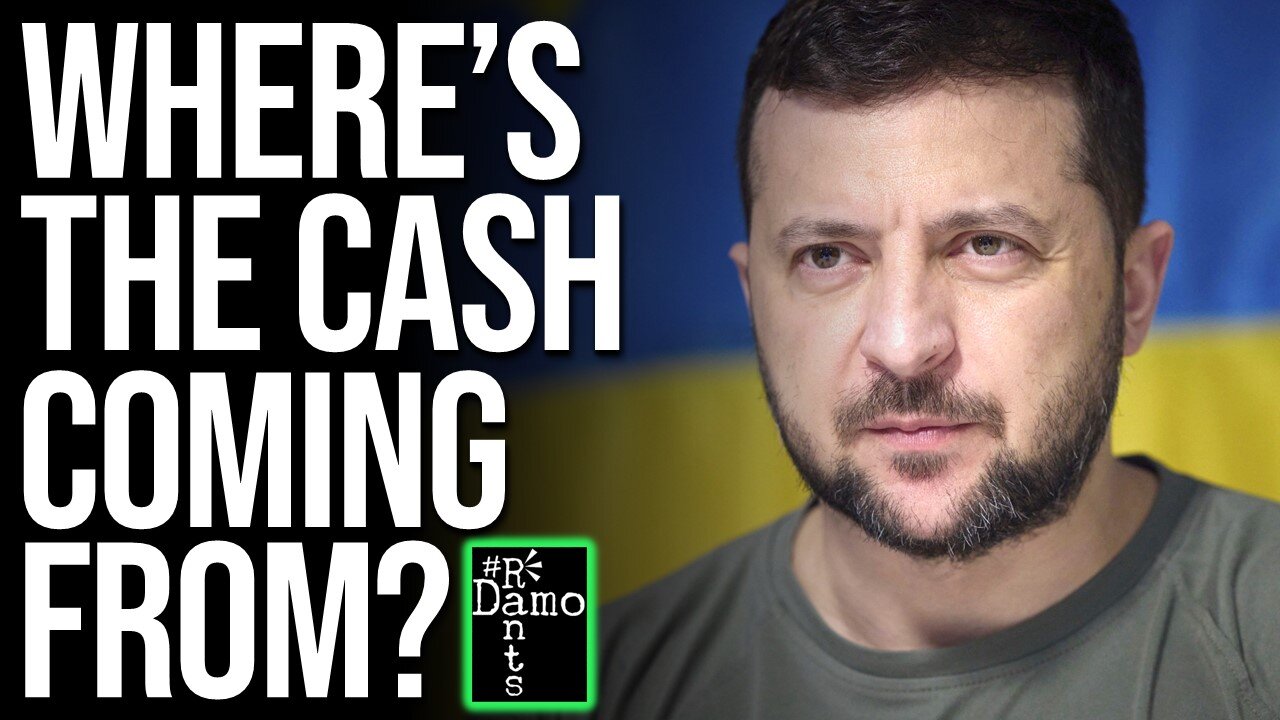Premium Only Content

Starmer Sends £1 BILLION A MONTH To Ukraine. Who's Paying?
Right, so as Keir Starmer hands yet more billions of pounds to Ukraine, to prop up a war instead of seeking an end to it, still talking up putting British boots on the ground in Ukraine and painting a target on the UK for Russian aggression should he do so, the cost of Ukraine as we all live through a cost of living crisis is becoming a bigger issue in more people’s minds as they increasingly struggle to get by. We’re watching all this money going to perpetuate a war that should have ended two years ago if not for Boris Johnson’s interference, yet it seems Starmer can always find cash for his mate Zelensky, just never for us. We have to endure cuts, we have to tighten our belts because of the economic choices Starmer and Reeves are making, yet they can still give the equivalent of a billion pounds a month to Ukraine. The morality and the righteousness of whether to support Ukraine and what shape should take aside, the economic unfairness of who in effect is having to pay here and go without here to keep a war we are not involved in going, is a question few are seemingly brave enough to confront, preferring to bang the drums of war, and if Starmer is hoping to see a polling boost off the back of his actions here, he needs to be told if you want to send billions to Ukraine, stop making ordinary working class people be the ones effectively pay for it.
Right so, since Keir Starmer’s Labour government came to power in July last year, the UK has committed an astonishing £8.3 billion in aid to Ukraine in its ongoing war against Russia. A staggering sum, equating to roughly £1 billion per month, for every month Keir Starmer has been Prime Minister. He has of course been justifying this as a necessary contribution to global security and a stand against authoritarian aggression, Russia are the bad guys, it’s all very black and white as he paints it. However, as British households grapple with soaring living costs, rising taxes, and cuts to public services, the question of who is truly paying for this generosity has become an ever increasing debate. Whilst you can argue for the moral imperative to support Ukraine, I would also argue the type and shape of the aid we provide, the scale of the UK’s financial commitment to Ukraine is raising serious concerns about the government’s priorities and the burden being placed on ordinary working class people
In July 2024, shortly after taking office, Starmer’s government pledged the first chunk of cash to Ukraine, £3 billion in annual aid to Ukraine, vowing to sustain this level of support “for as long as it takes”. By January of this year though, this figure had risen to £4.5 billion, apparently reflecting the escalating costs of the conflict and the UK’s determination to remain a key ally to Kyiv, though a cynic might suggest that Starmer is determined that this war could be turned to his own political advantage and as his numbers slide, he boosts support to Ukraine again. Move on to the here and now though and we got this announcement:
A further £2.2 billion in loans gets approved, purportedly to be paid for with seized Russian assets, but for one, that actually is only covering roughly a quarter of the loan, and for two, that actually amounts to theft. On top of that, £1.6bn in UK export fiannce is being used to buy Ukraine 5,000 air defence missiles, so this is money that isn’t really even going to Ukraine, it’s going straight to arms manufacturers to boost their profits, because lets face war is big business and at the moment on the global stage it is booming. That £4.8bn could have bought something like 20 hospitals here, but Ukraine needs our money more than we do apparently.
Cumulatively, this amounts to £8.3 billion in just eight months which is just the most staggering sum and it made me wonder actually, what happened to the £22bn fiscal black hole Rachel Reeves said we had, surely this is a sum of money we simply cannot afford as a nation?
What it actually all comes down to is government choice, because there is always money for what they want and as the old adage goes, there is always money for war.
Understandably, handing all this money to Ukraine in the form of military aid particularly as so much of it is form has come in for justifiable criticism that the government’s largesse towards Ukraine is being funded at the expense of British taxpayers, who are already struggling with a cost-of-living crisis, rising taxes, and cuts to essential services being inflicted by the same government giving all of this aid away to Ukraine. The question of who is paying for this aid is not just a matter of fiscal responsibility but also one of social justice.
The UK’s financial commitment to Ukraine has coincided with a series of painful economic measures at home. Rail fares, for instance, have risen by an inflation-busting 4.6%, adding to the financial strain on commuters. Council tax is set to increase by at least the standard maximum of 4.99% in most areas, hitting everyone in the pocket yet again. Water bills, meanwhile, are set to rise by up to 41% over the next five years, a move that has been described as completely unaffordable, not to mention insulting as the river pollution these companies have caused, they are now charging us all the more to now clean up, aided and abetted it seems by the water regulator Ofwat. Energy bills are also surged, another tale of privatisation hammering us as the government and regulator stand by and allow it, so much for renationalisation, the gravy train continues with a 6.4% increase announced recently, bringing the total rise in energy costs to 18.4% since Starmer took office. Do you remember when he said he’d slash our energy bills by £300? I still do, but then we should all know what Starmer’s word is worth these days shouldn’t we?
People using public transport have also been hit hard, with local bus fares rising by 50% across the country, hammering commuters, much as is the case with those aforementioned rail fares. This has left many people, particularly those in rural areas, struggling to absorb access work, education, and healthcare costs. At the same time, inflation has reached a 10-month high, eroding household incomes and exacerbating the cost-of-living crisis still further. Add to that the government’s decision to freeze the personal tax allowance and we see the phenomena known as fiscal drag come into effect, whereas the minimum wage rises come the new tax year, the tax free allowance does not, ‘dragging’ more people into paying income tax for the first time. Yet another squeeze on household budgets with little room to be squeezed any more.
The money handed over to Ukraine could have offset tuition fee hikes coming in, when too many students are already using food banks. It could have covered the cut to the winter fuel allowance for pensioners, but Zelensky gets that cash instead in effect. When so much cash is going abroad and none is being invested here, it’s a natural train of thought is it not?
UK’s support for Ukraine outside of government is undoubtedly rooted in a moral imperative to defend democracy and resist Russian aggression, even if NATO expansionism plays a very real part in this story too. 60% of Brits support Ukraine against Russia, however it is very notable that 78% of Ukrainians back peace talks and not more war.
However, the scale of the financial commitment raises valid questions about the government’s priorities. Is it right to spend billions on a foreign conflict while British households are being asked to pay more for essential services? Is it fair to impose such a heavy burden on ordinary working class people, many of whom are already struggling to make ends meet? As far Keir Starmer is concerned yes. According to a poll out today, he is getting an approval ratings boost, so watch even more money get announced in due course if that carries on, an 11 point swing in his favour, though it still leaves more than half of those polled thinking he's rubbish.
The war in Ukraine is not just a regional conflict but a global crisis that has obvious implications for international security, energy supplies, and food prices, particularly across Europe. The UK’s support for Ukraine is part of a wider international effort to resist Russian aggression and uphold the principles of sovereignty and self-determination, again that NATO caveat where blame ultimately lies must be acknowledged too. However, this does not absolve Starmer’s government of its responsibility to ensure that its policies are fair and sustainable.
Where other countries have also provided significant aid to Ukraine, but have done so while maintaining a focus on domestic issues, the UK, by contrast, is prioritising its international reputation over the needs of its own citizens. So where Starmer might be benefitting from some faint praise right now, he risks fuelling even further public resentment and distrust in the government if he doesn’t start making people feel better off in this country as well.
The UK’s aid to Ukraine raises important questions about transparency and accountability as well. While the government has been quick to announce its financial commitments, it has been less forthcoming about how these commitments are being fully funded but we’re all feeling the where in our everyday lives. The public has a right to know how their taxes are being spent and whether the government is striking the right balance between international obligations and domestic priorities.
There is also a need for greater scrutiny of the impact of the UK’s aid on the ground in Ukraine. While the government has emphasised the importance of supporting Ukraine’s defence efforts, there are concerns about corruption and mismanagement within the Ukrainian government. The UK must ensure that its aid is being used effectively and that it is not being diverted or misused and the rush to throw money at Zelensky at the rate it is happening again raises concerns here as well.
The scale of the support for Ukraine—£8.3 billion in just eight months—raises serious questions about the government’s priorities and the burden being placed on British taxpayers. At a time when households are facing rising costs, higher taxes, and cuts to public services, the government’s decision to prioritise Ukraine over domestic needs is not a matter that is going to go away and people deserve answers as to when some of the billions Starmer is finding will get spent on their needs too.
As the cost-of-living crisis continues to bite, the government must listen to the voices of ordinary citizens or risk becoming even more unpopular than ever before. The question of who is paying for the UK’s aid to Ukraine is not just a matter of fiscal responsibility but also one of social justice and we’re not seeing a lot of justice here in the UK right now.
Of course one other aspect which has really got people angry in light of all this money going to Ukraine specifically, is that Keir Starmer has also slashed international aid by 40% in favour of defence spending here in the UK and if you’re going to keep on poking the Russian bear I suppose you might consider that necessary, but it again is not helping ordinary people out in their everyday lives and now not even the small amount we use to help the most vulnerable people around the world either. Why did Starmer bother to enter politics? Get all the details of that story in this video recommendation here as your suggested next watch. Please do also hit like, share and subscribe to ensure you don’t miss out on all new daily content as well as help support the channel at the same time which is always very much appreciated and I will hopefully catch you on the next vid. Cheers folks.
-
 23:28
23:28
CatfishedOnline
22 hours agoVictim Finds Out Both His Internet Girlfriends Are Romance Scammers!
4.45K6 -
 23:47
23:47
Fit'n Fire
20 hours ago $0.61 earnedThe Truth About the *NEW* Springfield Kuna | First 300+ Rounds
5.48K3 -
 21:48
21:48
JasminLaine
18 hours agoRoom Goes DEAD SILENT After Poilievre RIPS Into Mark Carney—Even CBC Can't Defend Him
4.81K12 -
 1:47:36
1:47:36
TheDozenPodcast
19 hours agoThe Islamic threat people are too FRIGHTENED to discuss: Bob of Speakers’ Corner speaks out
4.78K3 -
 9:54
9:54
GBGunsRumble
12 hours agoOsight S and Osight X Introduction
4.15K3 -
 29:17
29:17
The Why Files
15 hours agoSTRIPPED: Proving the Afterlife | The Scole Experiments
46.1K35 -
 8:00:00
8:00:00
SpartakusLIVE
14 hours agoDuos w/ Oakboi || The Ultimate WZ Taterfarm
57.3K1 -
 28:36
28:36
SB Mowing
2 days agoShe Couldn’t AFFORD to Keep It Clean Anymore, So I Stepped In
36.2K18 -
 7:54:04
7:54:04
MyronGainesX
23 hours ago $37.31 earnedOKC Bombing 30 Years Later, Vitaly And Somali Trouble, Durk Case Dissmissal, And MORE!
159K33 -
 1:26:34
1:26:34
Iggy Azalea
9 hours ago $11.10 earnedGambling on my casino cause and you know you love it
66.7K28